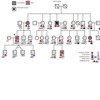Whole Exome Sequencing Identifies Multiple, Complex Etiologies in an Idiopathic Hereditary Pancreatitis Kindred
Abstract
Context Hereditary pancreatitis is the early onset form of chronic pancreatitis that is carried in an autosomal dominant pattern with variable penetrance. While 80% of hereditary pancreatitis has been shown to be due to a single mutation in the trypsinogen gene PRSS1, a number of hereditary pancreatitis families have no identified genetic cause for illness; thus no reliable screening options or clear therapy. Objective To explore the use of massive parallel DNA sequencing technology to discover the etiology of pancreatitis in a family with idiopathic hereditary pancreatitis. Design Candidate gene screening and verification within a kindred. Setting Prospective cohort study, university based. Patients or participants Kindred with idiopathic hereditary pancreatitis. Interventions None. Main outcome measures Identification of DNA variants predicted to increase susceptibility to pancreatitis. Methods Whole exome sequencing of two distantly related subjects with variant-specific confirmation in the subjects and other family members. Results We identified three deleterious genetic changes in the three major pancreatitis associated genes (PRSS1 CNV, SPINK1 c.27delC and CFTR R117H), two of which were carried by each patient. Individual targeted assays confirmed these variations in the two whole exome sequencing patients as well as affected and non-affected pedigree members. Conclusion Whole exome sequencing was useful for rapid screening of candidate genes linked to pancreatitis. This method opens the door for time- and cost-effective screening of multiple disease-associated genes and modifying factors that associate in different ways to generate a complex genetic disorder.Downloads
References
Whitcomb DC, Gorry MC, Preston RA, Furey W, Sossenheimer MJ, Ulrich CD, et al. Hereditary pancreatitis is caused by a mutation in the cationic trypsinogen gene. Nature Genetics. 1996;14(2):141-5. [PMID: 8841182]
Howes N, Lerch MM, Greenhalf W, Stocken DD, Ellis I, Simon P, et al. Clinical and genetic characteristics of hereditary pancreatitis in Europe. Clin Gastroenterol Hepatol. 2004;2(3):252-61. [PMID 15017610]
Rebours V, Boutron-Ruault MC, Schnee M, Ferec C, Le Marechal C, Hentic O, et al. The natural history of hereditary pancreatitis: a national series. Gut. 2009 Jan;58(1):97-103. [PMID: 18755888]
Joergensen MT, Brusgaard K, Cruger DG, Gerdes AM, Schaffalitzky de Muckadell OB. Genetic, epidemiological, and clinical aspects of hereditary pancreatitis: a population-based cohort study in Denmark. The American journal of gastroenterology. 2010 Aug;105(8):1876-83. [PMID: 20502448]
Witt H, Luck W, Hennies HC, Classen M, Kage A, Lass U, et al. Mutations in the gene encoding the serine protease inhibitor, Kazal type 1 are associated with chronic pancreatitis. Nature Genetics. 2000;25(2):213-6. [PMID 10835640]
Sharer N, Schwarz M, Malone G, Howarth A, Painter J, Super M, et al. Mutations of the cystic fibrosis gene in patients with chronic pancreatitis. New England Journal of Medicine. 1998;339(10):645-52. [PMID 9725921]
Cohn JA, Friedman KJ, Noone PG, Knowles MR, Silverman LM, Jowell PS. Relation between mutations of the cystic fibrosis gene and idiopathic pancreatitis. New England Journal of Medicine. 1998;339(10):653-8. [PMID 9725922]
Schneider A, Larusch J, Sun X, Aloe A, Lamb J, Hawes R, et al. Combined Bicarbonate Conductance-Impairing Variants in CFTR and SPINK1 Variants Are Associated With Chronic Pancreatitis in Patients Without Cystic Fibrosis. Gastroenterology. 2011 Jan;140(1):162-71. [PMID: 20977904]
Whitcomb DC. Genetic aspects of pancreatitis. Annu Rev Med. 2010;61:413-24. [PMID: 20059346]
Masson E, Chen JM, Scotet V, Le Marechal C, Ferec C. Association of rare chymotrypsinogen C (CTRC) gene variations in patients with idiopathic chronic pancreatitis. Hum Genet. 2008 Feb;123(1):83-91. [PMID: 18172691]
Masson E, Le Marechal C, Delcenserie R, Chen JM, Ferec C. Hereditary pancreatitis caused by a double gain-of-function trypsinogen mutation. Hum Genet. 2008 Jun;123(5):521-9. [PMID: 18461367]
Applebaum-Shapiro SE, Finch R, Pfützer RH, Hepp LA, Gates L, Amann S, et al. Hereditary Pancreatitis in North America: The Pittsburgh - Midwest Multi-Center Pancreatic Study Group Study. Pancreatology. 2001;1(5):439-43. [PMID 12120221]
R Development Core Team (2011). R: A language and environment for statistical computing. R Foundation for Statistical Computing, Vienna, Austria. ISBN 3-900051-07-0, URL http://www.R-project.org/
Le Marechal C, Chen JM, Le Gall C, Plessis G, Chipponi J, Chuzhanova NA, et al. Two novel severe mutations in the pancreatic secretory trypsin inhibitor gene (SPINK1) cause familial and/or hereditary pancreatitis. Hum Mutat. 2004 Feb;23(2):205. [PMID: 14722925]
Whitcomb DC, Yadav D, Adam S, Hawes RH, Brand RE, Anderson MA, et al. Multicenter approach to recurrent acute and chronic pancreatitis in the United States: the North American Pancreatitis Study 2 (NAPS2). Pancreatology. 2008;8(4-5):520-31. [PMID: 18765957]
Thauvin-Robinet C, Munck A, Huet F, Genin E, Bellis G, Gautier E, et al. The very low penetrance of cystic fibrosis for the R117H mutation: a reappraisal for genetic counselling and newborn screening. J Med Genet. 2009 Nov;46(11):752-8. [PMID: 19880712]
Felderbauer P, Klein W, Bulut K, Ansorge N, Dekomien G, Werner I, et al. Mutations in the calcium-sensing receptor: a new genetic risk factor for chronic pancreatitis? Scand J Gastroenterol. 2006 Mar;41(3):343-8. [PMID: 16497624]
Talamini G, Bassi C, Falconi M, Frulloni L, Di Francesco V, Vaona B, et al. Cigarette smoking: an independent risk factor in alcoholic pancreatitis. Pancreas. 1996;12(2):131-7. [PMID 8720658]
Yadav D, Hawes RH, Brand RE, Anderson MA, Money ME, Banks PA, et al. Alcohol consumption, cigarette smoking, and the risk of recurrent acute and chronic pancreatitis. Arch Intern Med. 2009 Jun 8;169(11):1035-45. [PMID: 19506173]
Morinville VD, Lowe ME, Elinoff BD, Whitcomb DC. Hereditary pancreatitis amlodipine trial: a pilot study of a calcium-channel blocker in hereditary pancreatitis. Pancreas. 2007 Nov;35(4):308-12. [PMID: 18090235]
Accurso FJ, Rowe SM, Clancy JP, Boyle MP, Dunitz JM, Durie PR, et al. Effect of VX-770 in persons with cystic fibrosis and the G551D-CFTR mutation. N Engl J Med. 2010 Nov 18;363(21):1991-2003. [PMID: 21083385]

Copyright (c) 2014 Jessica LaRusch, M Michael Barmada, Shiela Solomon, David C Whitcomb

This work is licensed under a Creative Commons Attribution 4.0 International License.
As a member of Publisher International Linking Association, PILA, iMedPub Group’s JOP follows the Creative Commons Attribution License and Scholars Open Access publishing policies. Journal of the Pancreas is the Council Contributor Member of Council of Science Editors (CSE) and following the CSE slogan Education, Ethics, and Evidence for Editors.